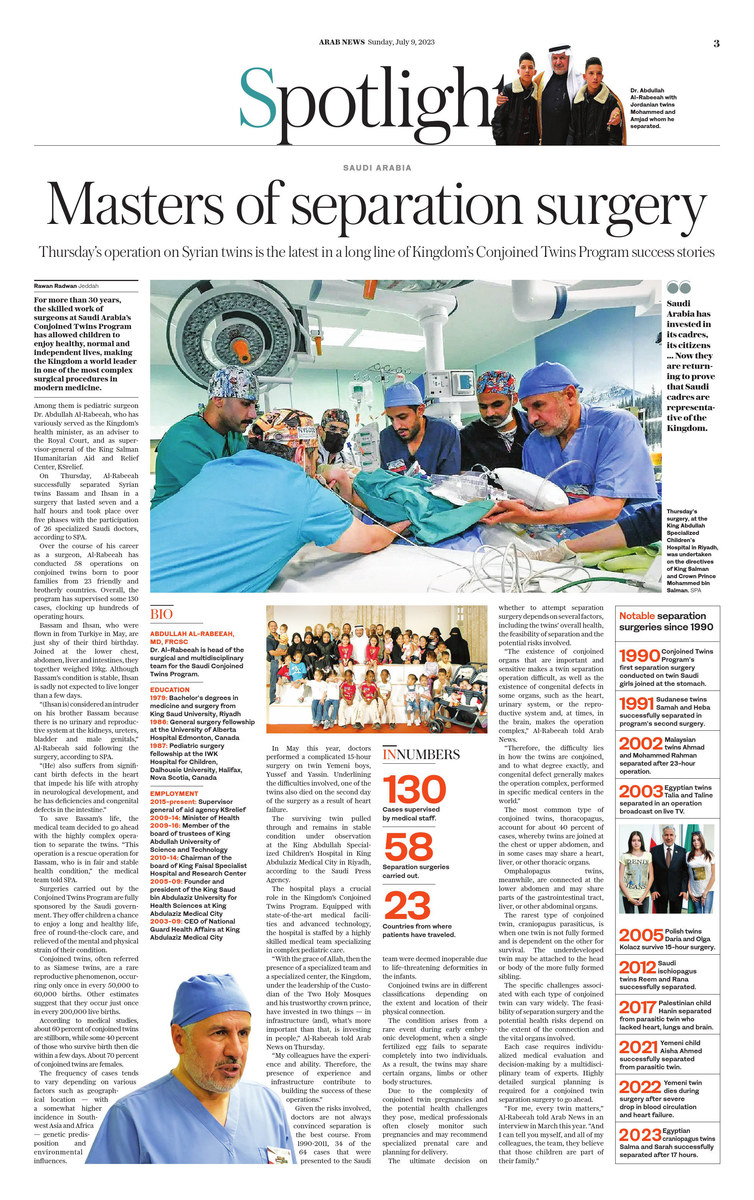JEDDAH: For more than 30 years, the skilled work of surgeons at Saudi Arabia’s Conjoined Twins Program has allowed children to enjoy healthy, normal and independent lives, making the Kingdom a world leader in one of the most complex surgical procedures in modern medicine.
Among them is pediatric surgeon Dr. Abdullah Al-Rabeeah, who has variously served as the Kingdom’s health minister, as an adviser to the Royal Court, and as supervisor-general of the King Salman Humanitarian Aid and Relief Center, KSrelief.
On Thursday, Al-Rabeeah successfully separated Syrian twins Bassam and Ihsan in a surgery that lasted seven and a half hours and took place over five phases with the participation of 26 specialized Saudi doctors, according to SPA.
Over the course of his career as a surgeon, Al-Rabeeah has conducted 58 operations on conjoined twins born to poor families from 23 countries. Overall, the program has supervised some 130 cases, clocking up hundreds of operating hours.
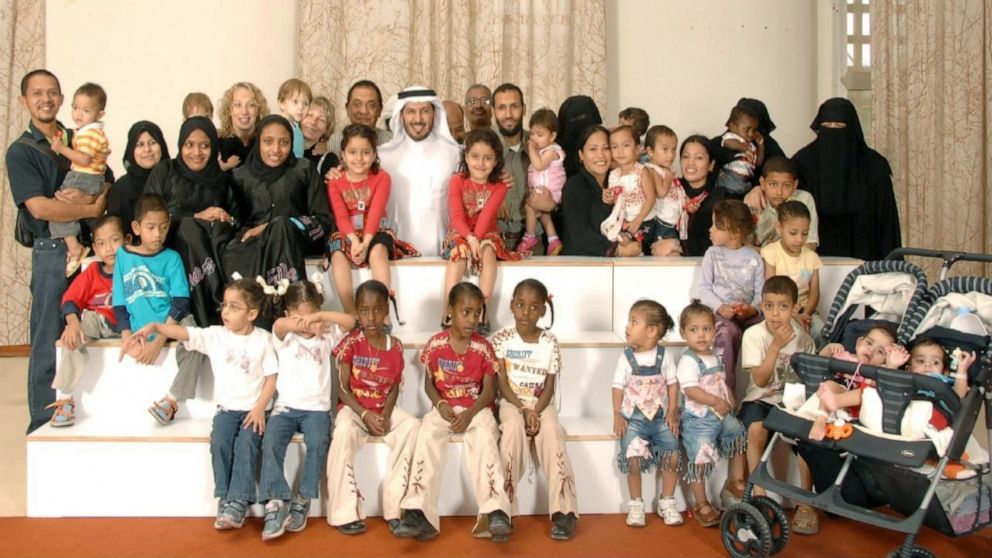
Dr. Abdullah Al-Rabeeah poses with a multinational grouping of conjoined twins he has operated on in 2010. (Supplied)
Bassam and Ihsan, who were flown in from Turkiye in May, are just shy of their third birthday. Joined at the lower chest, abdomen, liver and intestines, they together weighed 19kg. Although Bassam’s condition is stable, Ihsan is sadly not expected to live longer than a few days.
“(Ihsan is) considered an intruder on his brother Bassam because there is no urinary and reproductive system at the kidneys, ureters, bladder and male genitals,” Al-Rabeeah said following the surgery, according to SPA.
“(He) also suffers from significant birth defects in the heart that impede his life with atrophy in neurological development, and he has deficiencies and congenital defects in the intestine.”
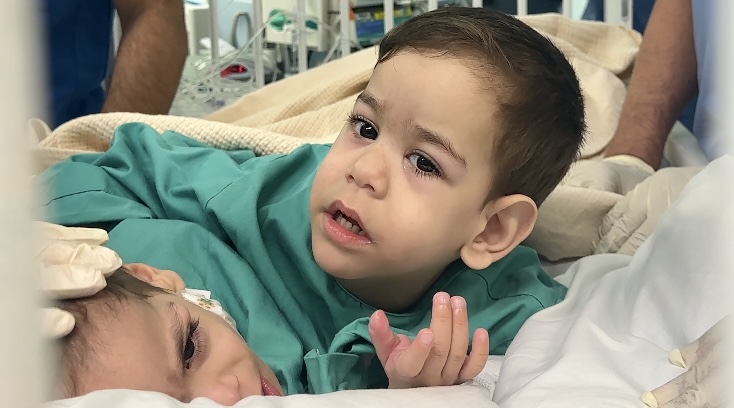
Before the July 6 separation surgery, Bassam and Ihsan were joined at the lower chest, abdomen, liver and intestines. (Huda Bashatah photo/Arab News)
To save Bassam’s life, the medical team decided to go ahead with the highly complex operation to separate the twins. “This operation is a rescue operation for Bassam, who is in fair and stable health condition,” the medical team told SPA.
Surgeries carried out by the Conjoined Twins Program are fully sponsored by the Saudi government. They offer children a chance to enjoy a long and healthy life, free of round-the-clock care, and relieved of the mental and physical strain of their condition.
Conjoined twins, often referred to as Siamese twins, are a rare reproductive phenomenon, occurring only once in every 50,000 to 60,000 births. Other estimates suggest that they occur just once in every 200,000 live births.
INNUMBERS
130 Cases supervised by medical staff.
58 Separation surgeries carried out.
28 Countries from where patients have traveled.
According to medical studies, about 60 percent of conjoined twins are stillborn, while some 40 percent of those who survive birth then die within a few days. About 70 percent of conjoined twins are females.
The frequency of cases tends to vary depending on various factors such as geographical location — with a somewhat higher incidence in Southwest Asia and Africa — genetic predisposition and environmental influences.
In May last year, doctors performed a complicated 15-hour surgery on twin Yemeni boys, Yousef and Yassin. Underlining the difficulties involved, one of the twins also died on the second day of the surgery as a result of heart failure.
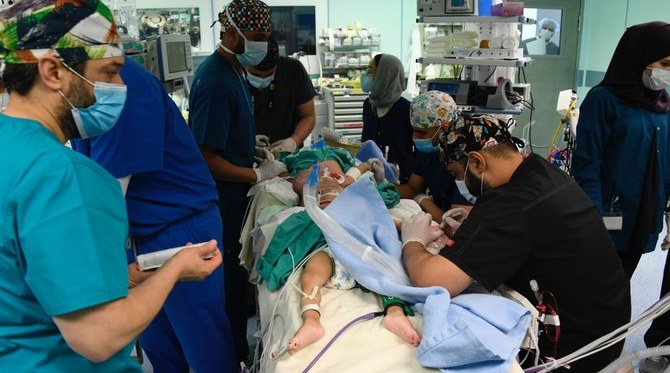
Yemeni conjoined twins Yousef and Yassin after a “complicated” non-stop surgery that lasted 15-hours in May 2022. (SPA/File photo)
The surviving twin pulled through and remains in a stable condition under observation at the King Abdullah Specialized Children’s Hospital in King Abdulaziz Medical City in Riyadh, according to the Saudi Press Agency.
The hospital plays a crucial role in the Kingdom’s Conjoined Twins Program. Equipped with state-of-the-art medical facilities and advanced technology, the hospital is staffed by a highly skilled medical team specializing in complex pediatric care.
“With the grace of Allah, then the presence of a specialized team and a specialized center, the Kingdom, under the leadership of the Custodian of the Two Holy Mosques and his trustworthy crown prince, have invested in two things — in infrastructure (and), what’s more important than that, is investing in people,” Al-Rabeeah told Arab News on Thursday.
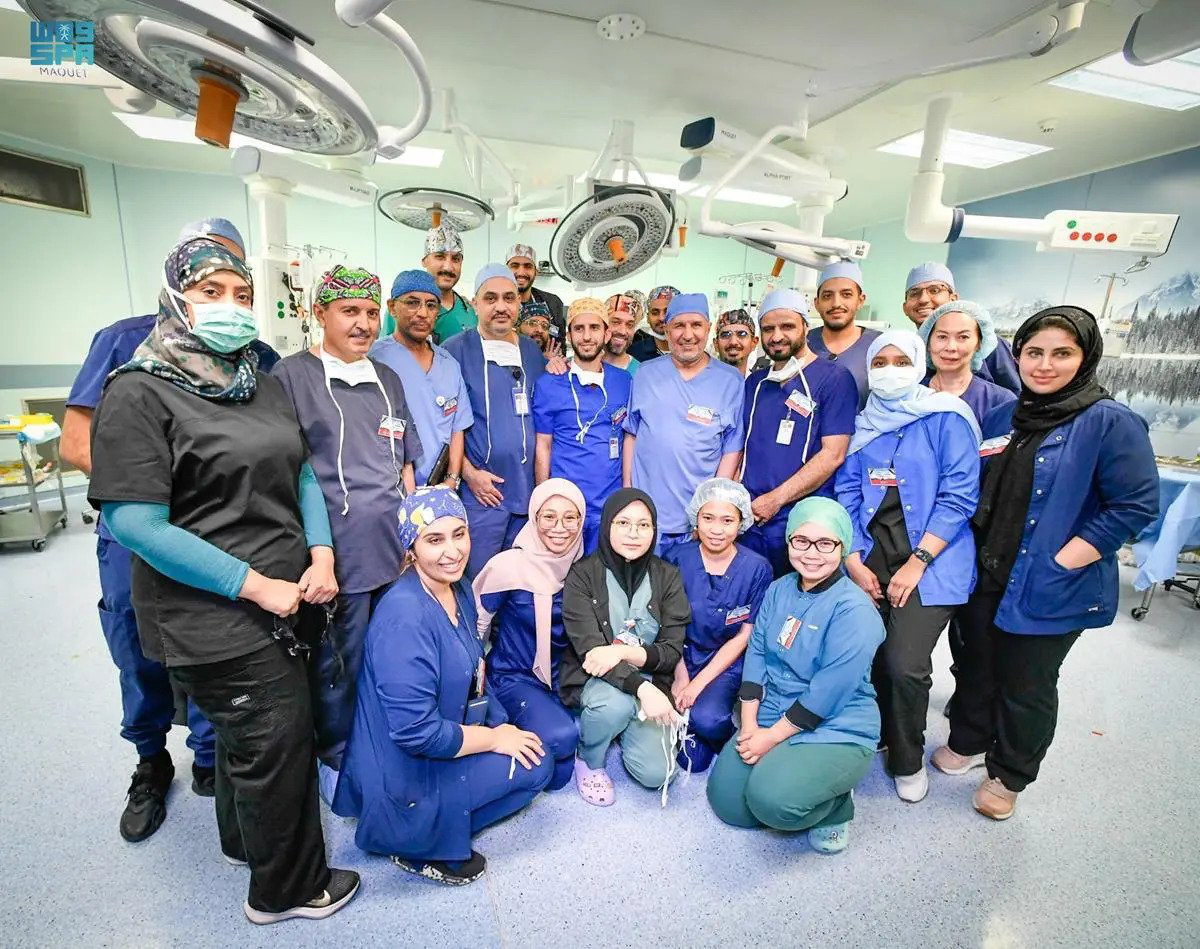
Dr. Abdullah Al-Rabeeah and his team had carried out 58 separation surgeries under Saudi Arabia’s Conjoined Twins Program. (SPA photo)
“My colleagues have the experience and ability. Therefore, the presence of experience and infrastructure contribute to building the success of these operations.”
Given the risks involved, doctors are not always convinced separation is the best course. From 1990-2011, 34 of the 64 cases that were presented to the Saudi team were deemed inoperable due to life-threatening deformities in the infants.
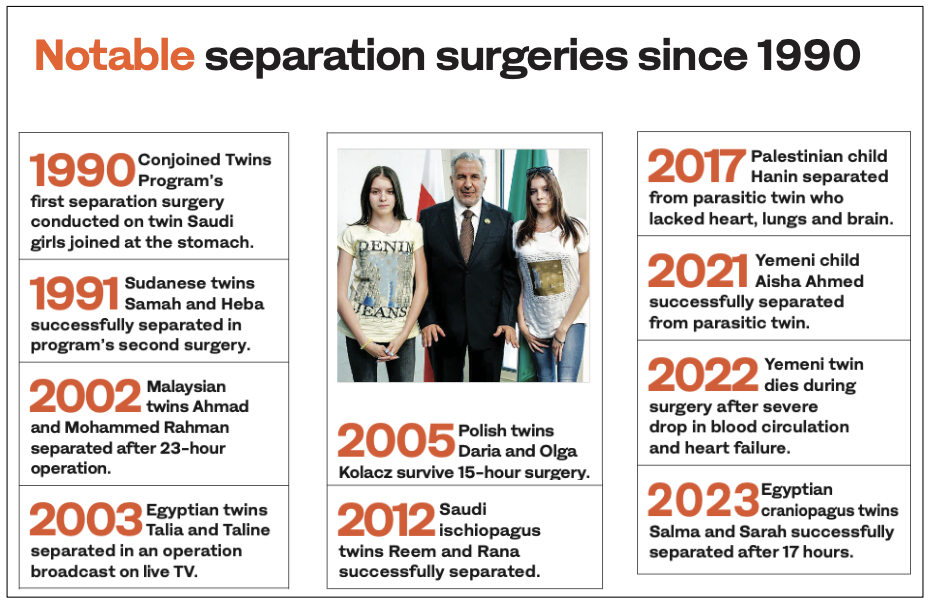
Conjoined twins are in different classifications depending on the extent and location of their physical connection.
The condition arises from a rare event during early embryonic development, when a single fertilized egg fails to separate completely into two individuals. As a result, the twins may share certain organs, limbs or other body structures.
Due to the complexity of conjoined twin pregnancies and the potential health challenges they pose, medical professionals often closely monitor such pregnancies and may recommend specialized prenatal care and planning for delivery.
The ultimate decision on whether to attempt separation surgery depends on several factors, including the twins’ overall health, the feasibility of separation and the potential risks involved.
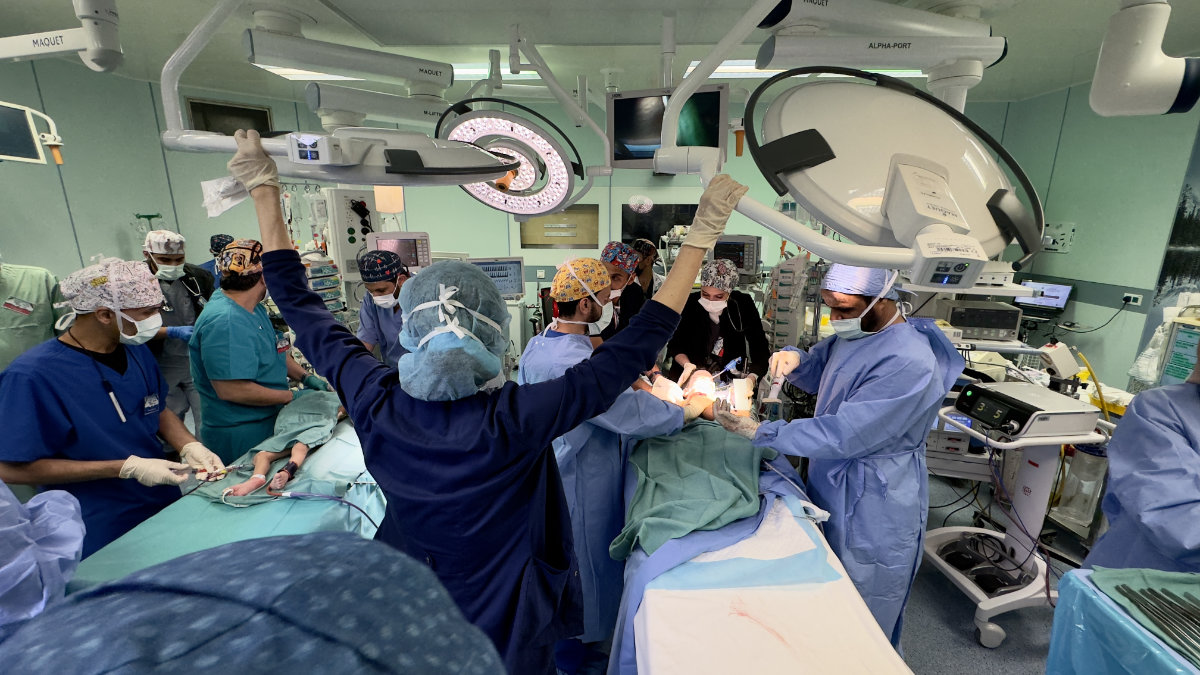
Dr. Abdullah Al Rabeeah and his team are seen working on the newly separated Syrian Siamese twins, Bassam and Ihsan, on July 6, 2023 at King Abdullah Specialist Children's Hospital in Riyadh. (Huda Bashatah/Arab News)
“The existence of conjoined organs that are important and sensitive makes a twin separation operation difficult, as well as the existence of congenital defects in some organs, such as the heart, urinary system, or the reproductive system and, at times, in the brain, makes the operation complex,” Al-Rabeeah told Arab News.
“Therefore, the difficulty lies in how the twins are conjoined, and to what degree exactly, and congenital defect generally makes the operation complex, performed in specific medical centers in the world.”
The most common type of conjoined twins, thoracopagus, account for about 40 percent of cases, whereby twins are joined at the chest or upper abdomen, and in some cases may share a heart, liver, or other thoracic organs.
BIO
Abdullah Al-Rabeeah, MD, FRCSC
Dr. Al-Rabeeah is head of the surgical and multidisciplinary team for the Saudi conjoined twins program.
Education
- 1979: Bachelor’s degrees in medicine and surgery from King Saud University, Riyadh
- 1986: General surgery fellowship at the University of Alberta Hospital Edmonton, Canada
- 1987: Pediatric surgery fellowship at the IWK Hospital for Children, Dalhousie University, Halifax, Nova Scotia, Canada
Employment
- 2015-present: Supervisor general of aid agency KSrelief
- 2009-14: Minister of Health
- 2009-16: Member of the board of trustees of King Abdullah University of Science and Technology
- 2010-14: Chairman of the board of King Faisal Specialist Hospital and Research Center
- 2005-09: Founder and president of the King Saud bin Abdulaziz University for Health Sciences at King Abdulaziz Medical City
- 2003-09: CEO of National Guard Health Affairs at King Abdulaziz Medical City
Omphalopagus twins, meanwhile, are connected at the lower abdomen and may share parts of the gastrointestinal tract, liver, or other abdominal organs.
The rarest type of conjoined twin, craniopagus parasiticus, is when one twin is not fully formed and is dependent on the other for survival. The underdeveloped twin may be attached to the head or body of the more fully formed sibling.
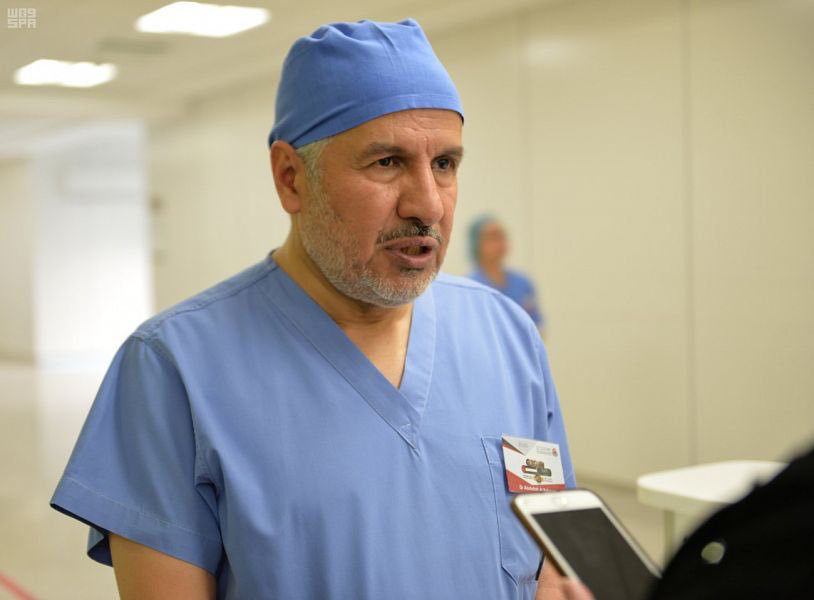
For Dr. Abdullah Al-Rabeeah, "every twin matters." (SPA photo)
The specific challenges associated with each type of conjoined twin can vary widely. The feasibility of separation surgery and the potential health risks depend on the extent of the connection and the vital organs involved.
Each case requires individualized medical evaluation and decision-making by a multidisciplinary team of experts. Highly detailed surgical planning is required for a conjoined twin separation surgery to go ahead.
“For me, every twin matters,” Al-Rabeeah told Arab News in an interview in March this year. “And I can tell you myself, and all of my colleagues, the team, they believe that those children are part of their family.”
